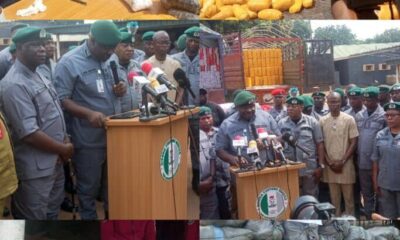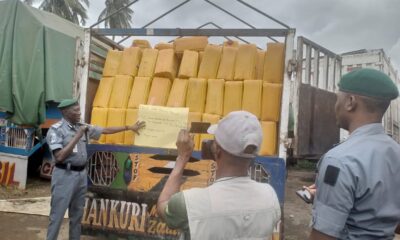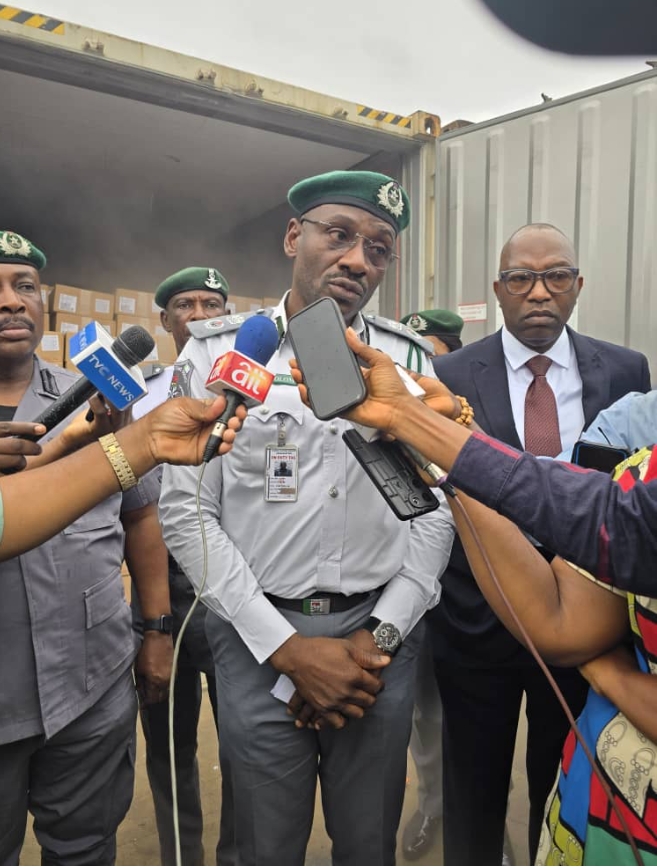Maritime Agencies
FOOD SCARCITY: Customs Kick-starts Distribution of Rice, other Items To Vulnerable Nigerians
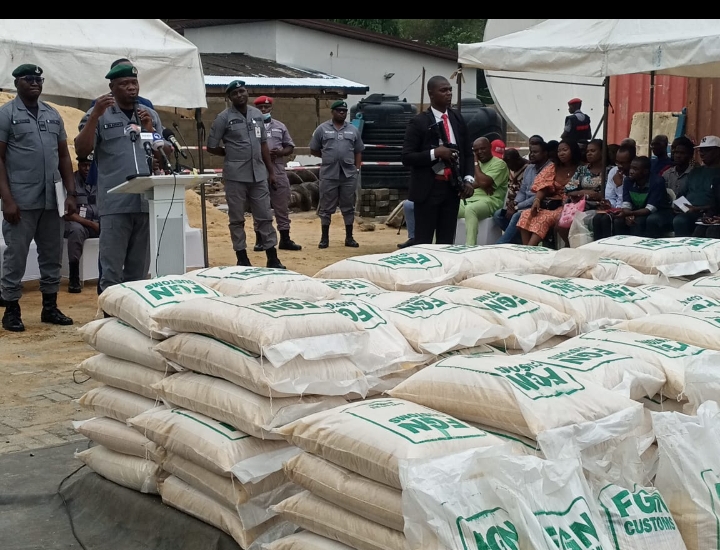
By Izuchukwu Ozoemena
As part of her intervention to address hunger currently ravaging the land, the Nigeria Customs Service (NCS), Thursday, commenced the distribution of 25 kg bags of rice each to vulnerable Nigerians especially those suffering under the harsh economic realities of the moment, having secured necessary approval from President Bola Tinubu.
Apart from rice, other items for distribution include dried fish and pepper, beans, maize, salt, sugar, garri, guinea corn, millet and soya beans.
At the take-off of the interventionist programme at the Nigeria Customs Service Zone A Headquarters, Harvey Road, Yaba, Lagos, the Comptroller- General of the Customs, Bashir Adewale Adeniyi, explained that the bags of rice, grains and other items were those confiscated from importers who contravened trade regulations.
Before the commencement of the exercise, he assured, necessary tests were carried out and recommendations obtained from the NAFDAC and other relevant agencies to ensure that the items were wholesome and fit for human consumption.
To make the bags of rice reach as many Nigerians as possible, the CGC announced, it has been repackaged into a 25 kg content to be sold at a token amount of N10,000.00.
Customs made it clear that to benefit from the sales, Nigerians must present a verifiable National Identification Number (NIN).
Targeted groups include artisans, teachers, nurses, religious bodies, and other people within the relevant operational units and areas of the Nigeria Customs Service. The CGC stressed that for the exercise to maintain integrity and achieve maximum impact, beneficiaries are to be reached directly through organized structures and associations to which they belong.
“ To ensure the security and integrity of this initiative, NCS has put in place comprehensive measures. These measures encompass robust security protocols throughout the process. Our officers will be closely monitoring the entire supply chain to prevent any misuse or diversion of the food items. Moreover, we have established strict guidelines and eligibility criteria to ensure that the items are distributed only to those in genuine need.”
“Additionally, we will be working
closely with relevant agencies to ensure compliance with the terms of this programme.”
“It is imperative that beneficiaries of this exercise understand that the items are not to be resold. We take a strong stance against any form of profiteering or exploitation of this initiative.”
Adeniyi urged Nigerians to report any incidences of misuse
or unauthorized re-sale of the seized food items as the NCS is fully committed to transparency and accountability in the process.
“We will not hesitate to take
decisive action against any individuals or entities found to be in violation of the terms of this programme.
He stressed that the NCS is committed to advancing the nation’s goals and objectives in alignment with the Federal Government’s policies and aspirations for a prosperous
Nigeria.
“Recognizing the significance of its responsibility to protect the society and facilitate trade,” the CGC stated, “NCS remains steadfast in its commitment to safeguarding
national interests and ensuring the well-being of all Nigerians.”
“ Furthermore, the NCS is committed to fostering a culture of transparency, accountability and public service. By upholding the highest standards of integrity and ethical conduct, the NCS will continue to earn the trust and confidence of the Nigerian people.”
“As a responsive and forward-thinking organization, the NCS will remain at the forefront of efforts to drive sustainable development, enhance
competitiveness and promote inclusive growth. In doing so, the NCS will contribute to the nation’s progress and prosperity, ensuring that the benefits of economic growth are shared equitably among all Nigerians”.
Adeniyi also said the Customs Service has remained responsive in carrying out its mandate to protect the borders from the inflow and outflow of restricted goods.
Maritime Agencies
OIL FACILITIES PROTECTION: Tompolo’s Tantita Acquires High-Tech Drones From US Firm.

By Izuchukwu Ozoemena
Tantita Security Services Ltd (TSSL), the company in charge of security surveillance over oil and gas installations in Nigeria’s Niger Delta region, is in collaboration with Textron Systems Corporation, a United States–based defence and aerospace company, to supply her three advanced Aerosonde Mk. 4.7 Vertical Takeoff and Landing (VTOL) uncrewed aircraft systems (UAS).
TSSNL owned by Chief Government Ekpemupolo (popularly known as Tompolo) disclosed the business deal in her website publication of December 29, 2025. The drones will be delivered in a fully ITAR-Free configuration.

The Aerosonde Mk. 4.7 is designed to operate without runways, utilising hybrid quadrotor technology that enables vertical takeoff and landing, as well as fixed-wing flight.

The Aerosonde Mk. 4.7 VTOL UAS, Textron Systems says, is a mature, industry-proven autonomous platform known for its high reliability and operational flexibility. Its dual-mode capability allows it to operate seamlessly in complex and high-risk environments, making it well-suited for security operations within Nigeria’s oil and gas sector.
Giving further insight into the contract, Senior Vice President, Air, Land and Sea Systems at Textron Systems, David Phillips, said the deployment would significantly enhance Tantita’s operational capability.
”The Aerosonde Mk. 4.7 VTOL UAS is a proven solution that will enable Tantita Security Services to expand its capabilities to protect the oil and gas infrastructure essential to Nigerian security and prosperity,” he stated.
The Aerosonde platform has accumulated over 700,000 flight hours across some of the world’s most challenging operating environments, underscoring its reliability and performance.
Tantita Security Services is expected to deploy the systems to strengthen surveillance and protection of critical oil and gas assets across Nigeria.
The contract also includes options for operator training and the supply of additional aircraft to support future capability expansion. Textron Systems noted that the agreement builds on a previous Foreign Military Sale (FMS) contract to Nigeria, further highlighting its ongoing commitment to supporting Nigerian security operations.
Textron Systems is a global leader in uncrewed air, land and sea systems, with the Aerosonde family of UAS currently supporting international customers and operations aboard more than 10 U.S. Navy ships. The company is a subsidiary of Textron Inc. (NYSE: TXT), a diversified multinational with interests spanning aviation, defence, industrial manufacturing and finance.
With multiple payload configurations and comprehensive training and support services, the Aerosonde Mk. 4.7 VTOL UAS offers a versatile and efficient solution for security operations in demanding environments, reinforcing Tantita Security Services’ role in safeguarding Nigeria’s critical energy infrastructure.
Maritime Agencies
NEW YEAR CELEBRATION: MARAN Appreciates Stakeholders, Requests Greater Support and Collaboration in 2026.

By Izuchukwu Ozoemena
As Nigeria joins the rest of the world to celebrate a brand new year, the pioneer maritime journalists’ group, the Maritime Reporters Association of Nigeria (MARAN), has implored the entire business community, especially maritime industry stakeholders, to join the association afresh in advancing the cause of the industry to ensure more impact and relevance in the national economy in the new year and beyond.
In a New Year message, MARAN Chairman, Mr. Tunde Ayodele described 2026 as a “year of greater impact,” stressing the need for improved service delivery and more robust maritime reportage to support national development.
According to him, the collective efforts of stakeholders in the outgoing year contributed positively to the growth of the maritime sector, urging all parties to sustain the spirit of unity and collaboration in the new year.
“United, we can make Nigeria proud by contributing our quota to national development, each from our own little corner,” the MARAN chairman said.
Ayodele reaffirmed MARAN’s readiness to collaborate with organisations and institutions across the maritime value chain, noting that such partnerships are crucial to making Nigeria’s maritime space one that is admired and celebrated.
He expressed appreciation for the cooperation and support extended to the association throughout 2025 and called for renewed commitment in the year ahead.
“Thank you for your cooperation and support in 2025. Let us do it again in 2026,” he added.
Maritime Agencies
NIGER DELTA SECURITY : Tantita Arrests 4 Oil Thieves, Nabs Vessel .
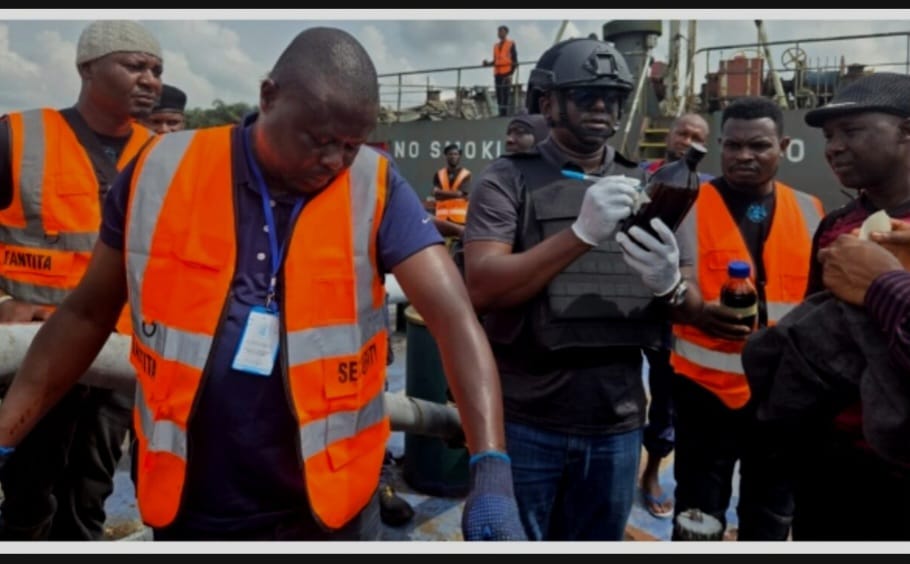
By Izuchukwu Ozoemena
In the ongoing efforts to thwart economic sabotage in the Niger Delta, Tantita Security Services Ltd, the firm engaged in pipeline surveillance operations in the oil -rich region, has nabbed four suspected oil thieves, intercepting their vessel named MT Thor. Suspects are to undergo trial for economic sabotage .
Speaking at the handover of the suspects at Koko Port, Tantita’s Executive Director of Operations, Capt Warredi Enisouh, said the suspects were apprehended with an unspecified quantity of suspected illegally-sourced petroleum products aboard the vessel.
The interception occurred on 15 December 2025, around the Koko–Excravos axis of Delta State, says a situation report made available by the Special Prosecution Team (SPT) of the Inter-Agency Task Force on Petroleum Product Theft.
The report stated that Tantita alerted the Head of Investigation of the SPT after intercepting MT Thor, allegedly laden with crude oil obtained through illicit means.
It was further alleged that the vessel was being escorted by personnel of the Police Marine Unit, Delta State, who reportedly claimed they were acting on directives from the Force Intelligence Department (FID), Abuja.
Preliminary investigations by law enforcement agencies revealed that the vessel, now classified as an exhibit in an ongoing criminal investigation, is linked to a jetty operated by Ebenco Global Services Limited. Investigation officers disclosed that documents and correspondence connected to the jetty were obtained and are currently under review.
“The owner of the jetty, Mr. Ebenezer, was contacted by investigators and reportedly provided additional documents, including court orders, which are also being analysed as part of the investigation.
“On December 16, a joint investigation team led by the Head of Investigation of the SPT conducted a Joint Inspection Visit in Koko. The team first met at Tantita’s corporate headquarters in Warri for a briefing, which was also attended by the jetty owner.
“During the inspection, investigators attempted to obtain samples from MT Thor but were unable to do so immediately as the vessel had not yet arrived at the jetty, having been towed from an earlier location by security operatives.
“While awaiting the vessel’s arrival, the team inspected other containers suspected to be carrying crude oil within the premises of Ebenco Global Links Limited, where samples were taken from a storage barge.
“MT Thor eventually berthed at about 8:30 p.m. on 16 December, prompting the joint team to adjourn sampling and other procedures until the following day. As of 17 December 2025, investigators were reported to be en route to Koko to continue sample collection and complete investigation formalities,” the report read.
Receiving the suspects, the Head of the Special Prosecution Team of the Inter-Agency Task Force, Omar Sini, reaffirmed the Federal Government’s resolve to dismantle crude oil theft networks in the Niger Delta, assuring that all findings would be thoroughly examined and prosecuted in line with the law.
-

 Customs3 weeks ago
Customs3 weeks agoNSC Boss, Akutah, Speaks At Maritime Journalists’ Seminar, Harps on Developing Trends the Press Cannot Overlook.
-

 Customs3 weeks ago
Customs3 weeks agoTincan Customs Achieves N51.8Bn Surplus Above 2025 Revenue Target
-

 Maritime Agencies2 weeks ago
Maritime Agencies2 weeks agoNIGER DELTA SECURITY : Tantita Arrests 4 Oil Thieves, Nabs Vessel .
-

 Maritime Agencies6 days ago
Maritime Agencies6 days agoOIL FACILITIES PROTECTION: Tompolo’s Tantita Acquires High-Tech Drones From US Firm.
-

 Maritime Agencies1 week ago
Maritime Agencies1 week agoNEW YEAR CELEBRATION: MARAN Appreciates Stakeholders, Requests Greater Support and Collaboration in 2026.


